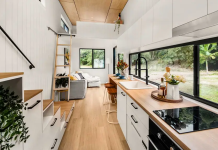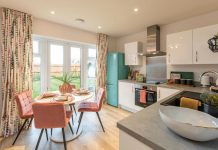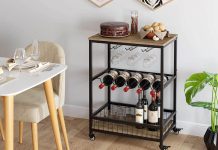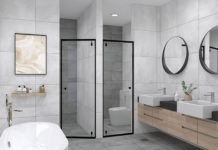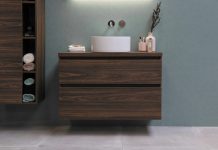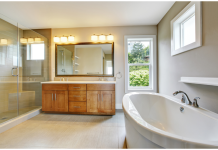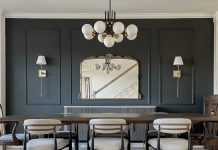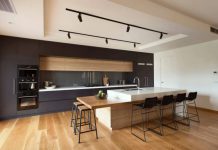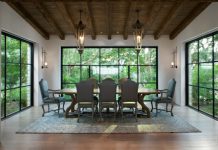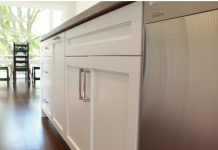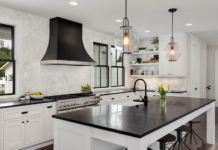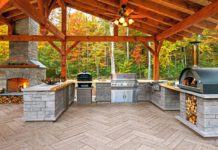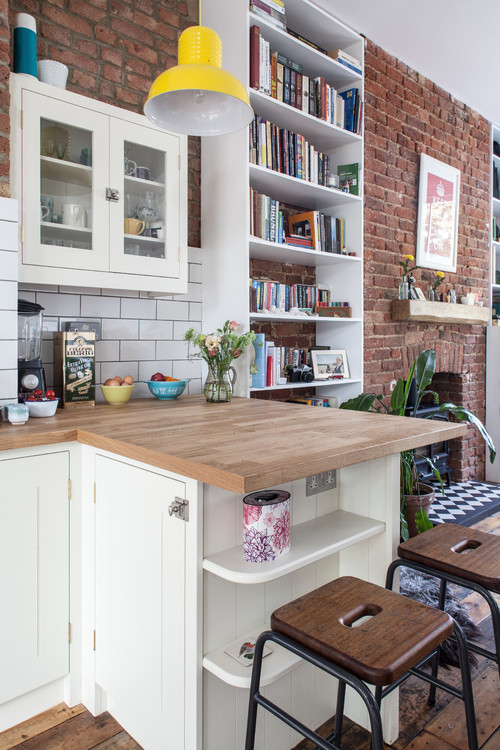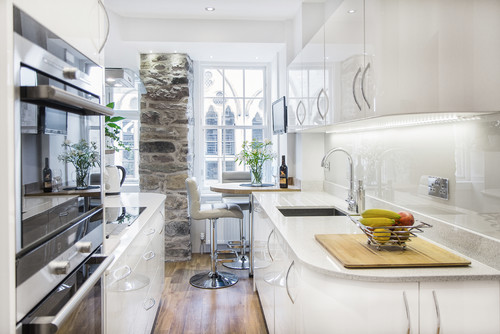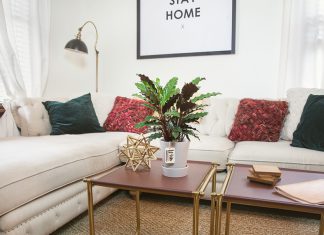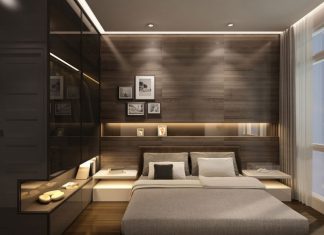If you’re a busy household, a breakfast bar can be an invaluable addition to the home, creating a relaxed and casual dining and meeting area. If you’re wondering if a breakfast bar is necessary for you, here is some information to help you make up your mind.
What is a Breakfast Bar?
A breakfast bar is an area within the kitchen where you can sit to eat meals, pay your bills, or where the kids can do their homework. It generally consists of a bench that overhangs from a piece of cabinetry enough to comfortable fit stools underneath. Basically, you could call it a table and a countertop all in one.
Benefits of a Breakfast Bar
There are several benefits to having a breakfast bar within your kitchen.
Firstly, you have an informal area where you can have your day to day meals. Your food is prepped in the kitchen and then you simply hop on a stool to eat it! This is incredible convenience wise and it can save you a lot of time if you are a busy household. Breakfast bars are also amazing space savers, and this can be important in smaller homes and kitchens where it is just not feasible to have a separate dining area at all. Breakfast bars generally seat from two to four people, making them the perfect space saving option dining wise. If you want to entertain more people, you can go outside to your large alfresco dining area, or use your formal dining room if you are lucky enough to have one.
Breakfast bars are about more than just a place to eat, though. Kitchens are natural congregating areas and so you’ll often find people doing a lot more than just working with food. If you need a simple, quick area to pay your bills or do some homework while still talking with your family, the breakfast bar is perfect. You can even use the breakfast bar to keep your kids entertained while you cook by installing a small TV or a computer!
Breakfast bars aren’t just functional, though. They can also be an important decorative item in the kitchen. If you have a separate breakfast bar on your island, you can use a different benchtop material than you have in the rest of the kitchen to make it stand out. Of course, the primary way that you can turn the breakfast bar into a bit of a feature is through the seating that you choose. You can choose to have backless stools or stools with backs and even armrests. Stools come in a range of materials from simple timber, to plastics, resins, upholstered models, metal and more. They also come in a huge range of colours and patterns so you can choose the one that suits your kitchen the best.
The formal, separate dining room has passed in and out of vogue over the decades, but the option of eating in the kitchen has always held appeal. The informal, efficient design of an eat-in kitchen is ideal for today’s casual, fast-paced lifestyle. At the same time, today’s tastes are distinctly more luxurious than they were a couple of decades ago.
Fortunately, unless you yearn for an authentic period home, there’s no reason why you can’t have a kitchen dining setup that’s both easygoing and opulent. Depending on the size of your kitchen, you have a number of choices for creating an eat-in kitchen. Today’s savvy design solutions and coordinated products ensure that any option you choose will fit right in and look great.
Counter Dining.
Where space is slim or where the users have no special needs, a breakfast bar looks great. A breakfast bar’s informality and slim silhouette lends itself naturally to a casual, contemporary scheme, but if your kitchen is opulently traditional, using the same materials for the counter and bar will tie it in perfectly. Imaginative counter stools can be great decorating assets. Make sure the counter overhang is deep enough to accommodate knees comfortably, and, if your stools don’t have footrests, make sure your bar has a footrest ledge or rail.A two-tiered peninsula or island can house a sink or cooktop on the lower, kitchen side with room for two to four diners opposite. If the peninsula or island houses only a small sink, there’s usually plenty of room to seat a number of diners on the same level as the work surface. (A cooktop requires more space and, if possible, the barrier of a different level for safety’s sake.) Ideally, allow at least 42 inches from the open end to the opposite wall, and don’t locate the fridge or wall oven opposite, where an open door would block traffic. Allow at least 18 inches and preferably 24 inches of elbow room for each diner. And if breakfast never will be your thing, rest assured your cozy nook or chic bar will work just fine for after-school and midnight snacks.
Breakfast Nooks. If you have a bit more available space or want a more traditional, cozy look, you might consider adding a breakfast area with built-in banquette seating. A bay window alcove, with a banquette serving as a window seat and with pull-up chairs on the other side of the table, is charming if you can manage it. You can create a welcoming air with plump bench or stool cushions that carry your color scheme.No matter how small your kitchen or how rushed your schedule, there is almost always a way to work a little breakfast into the equation. The breakfast nook with fitted bench or banquette seating is a cozy solution that works well in ethnic or country/cottage kitchen design schemes. It’s also a cute solution in retro settings inspired by a ’50s malt shop booth. The table may be freestanding or may be a peninsula, with one end anchored to the wall or to a run of cabinets. The coziest breakfast nook setup features benches that are parallel, with the table between.
For a more relaxed, open layout, the benches may be placed perpendicular to one another, with the table spanning the open side. A breakfast nook can be a comfortable solution where space is scant, because benches require much less floor space than chairs. If your family includes a mix of young and not-so-young, a breakfast nook may be a perfect — and practical — alternative. Benches are safer than counter stools for young children, and, because the table is a conventional height, it is accessible to wheelchair users.
Eat-in Kitchens.
For large kitchens, or those that feature a natural alcove, dining tables that seat anywhere from four to 12 people are a good option. You can have fun picking out chairs that complement your own personal taste, from heirloom traditional to classic modern glass-and-metal. Another option you may consider is having an island or table made of the same material as your cabinets or countertops. In keeping with the informal nature of kitchen dining, consider small armchairs all around, not just at the head and foot of the table.A round table is a friendly choice and is safer for an active family or in a smaller space. In the dining area of your kitchen, away from the stove, you can define a welcoming space with more elaborate curtains or draperies than you would use at a window in the work area. For continuity’s sake, match or coordinate your eating-area window treatments with those in the work area. Coordinate window treatments and tabletop textile colors with seating cushions for an inviting, total look.
1. Pop out a ledge. You don’t have to go large to get a hardworking breakfast bar. Not only is this mini peninsula big enough for two bar stools, it also has a cabinet and shelves for extra storage. This end-of-counter surface even helps separate the kitchen from the adjacent living space.
2. Take a U-turn. The owners of this bright, open-plan space have cleverly tucked their kitchen into the area next to the stairs. And the U-shaped design has created an instant breakfast bar.
Opting for white and pale gray features, including the countertops and stools, helps this substantially sized seating area blend in.
Related: What There is to Love About Soapstone Countertops
3. Go around a corner. If your kitchen is located in an open-plan room with a partition wall, get your place to perch by making use of the space as these homeowners have done. One run of cabinets continues beyond the wall, and the countertop turns the corner to form a ledge for bar stools to sit neatly under. It’s a really efficient way to use an awkward, unused area.
This idea can be adapted for a room with structural pillars too.
4. Book a table. Instead of opting for an island-breakfast bar, why not try a wall-fixed table? This one fits nicely at the back of this narrow kitchen and is the perfect spot for a glass of wine beside the window. And the curved design avoids the danger of sharp edges.
If you can’t install a wall-fixed model, hunt around for a tall free-standing table you can fit into a spare corner of the room.
5. Custom design to the space. In this kitchen-dining area the owners have managed to fit in quite a roomy island. The L-shaped footprint of the cabinets to the left could have presented a problem, as there might not have been enough room to pass between the “wall” and the island. To overcome this, the designers cut a corner off the island’s tabletop to provide easier access.
6. Stow storage in the surface. This overhanging countertop is super clever. Not only does it create a seating space, but it contains three nifty drawers too. But it gets better — a simple partition creates storage for glasses above the built-in wine cooler.
7. Float away. To create the illusion of space, it’s a good idea to keep furniture off the floor. The countertop here is extended from the kitchen cabinets to form a floating peninsula breakfast bar. The lack of base cabinets gives the room a feeling of flow. The designers also have thought carefully about the bar stools, choosing white tops to “melt” into the surface and wooden legs to blend into the floor.
8. Go along the walls. The compact kitchen here has plenty of storage along two walls, so the other wall has been utilized for a streamlined breakfast bar. Two swivel stools are tucked under and can be turned around to face each other or the chef. The narrow surface is large enough to enjoy breakfast and a glass of wine and some nibbles in the evening.
9. Size doesn’t matter. Sometimes even a small extra work surface is enough to make a difference in a busy kitchen. The compact island here provides a useful spot for preparation and even includes a handy cabinet. Anything larger wouldn’t have been able to fit in the space, so the size of this one is ideal.
Small kitchens with breakfast bars
Are you unable to utilize your kitchen efficiently because of its small size? Do you wish to maximize the available space in the kitchen? If this is the case, then you should consider introducing breakfast bars in your kitchen.

Frankly speaking, breakfast bars are a boon to small kitchens. Besides provides a convenient preparation space for cooking meals and serving as an extended kitchen countertop, breakfast bars also provide a space for enjoying informal breakfast dining. In addition, many breakfast bars also come with cabinet storage space, which allows you to store bulky pans, pots and miscellaneous items beneath the counter and free up the cabinet space.
Consider creating an island kitchen countertop in the middle of the small kitchen. The island top can be easily used as a preparation station for cooking meals. Moreover, it also doubles up to serve as a table top for enjoying informal breakfasts. When selecting the size and design of the countertop, prefer buying or building one that features enough free space underneath the counter so that the maximum utilization of the space is ensured. Place stools and chairs matching the counter top style in order to enjoy the space for dining. Make it a point to store the chairs in the store room when not in use in order to free up floor space.

If you do not wish to add anything permanent in the kitchen, you may consider installing a drop leaf table in the kitchen as a breakfast bar. Similar to the kitchen countertop, a drop leaf table also acts as a preparation station and breakfast table. You can easily fold out the leaves when there are extra guests for breakfast. Some of the drop leaf tables can be easily folded against the wall when not used, whereas some of the tables are available on wheels and are highly flexible.

A breakfast bar table can also be built in the space between the kitchen and living room. A wall of the kitchen may be torn down and replaced with a breakfast bar table. Besides offering a proper seating space in both the rooms, this ideal shall open up the space and create the illusion of free space. Consider placing tools and chairs that blend with the kitchen as well as the living room.





